No Splashing: Swimmers Banned from Popular Pond to Make Way for Boats
September 14, 2023
EXETER, R.I. — Unlike many other Rhode Island waterbodies, a local pond off Route 165 wasn’t contaminated this summer by fecal matter or toxic algae. The former swimming beach was closed in 2008 for other human-caused reasons.
With a week left in Summer 2023, freshwater and saltwater beaches around the state have been closed for a combined 288 days, the highest number of closures recorded since 2006.
Beaches are closed by order of the state Department of Health when they test positive for elevated levels of enterococci bacteria, which live in the intestinal tracts of warm-blooded animals, including humans, and indicate possible water contamination by fecal waste.
Last month the departments of health and environmental management advised people to avoid contact with Fishing Cove in Coventry, Coomer Lake in Glocester, and Roger Williams Park Ponds in Providence because of blue-green algae blooms. They aren’t the only waterbodies to have been sickened this year by pea soup gone bad.
Beach Pond, which spans both sides of Ten Rod Road in western Rhode Island, has been closed to swimming for 15 years. The 430-acre pond that straddles the border between Connecticut and Rhode Island wasn’t closed because of poop in the water or by cyanobacteria, though.
The pond, up to 60 feet deep in places, is on the state’s list of impaired waters because of the presence of non-native aquatic plants (variable milfoil and inflated bladderwort), but it is perfectly safe for swimming. But an army of “No Swimming” signs tells a different story.
In 2008, a few weeks before the unofficial start of summer — Memorial Day weekend — DEM closed Beach Pond to swimming, to install erosion-control measures. The beach has never been reopened to swimming.
Among the measures since implemented to — depending on your interpretation of the situation — close the beach to swimming or “to stabilize the shoreline and prevent runoff from entering the pond” included the “placement of rocky material” where the beach once was. Basically, thousands of decent-sized rocks (riprap) were dumped along the pond’s shoreline.
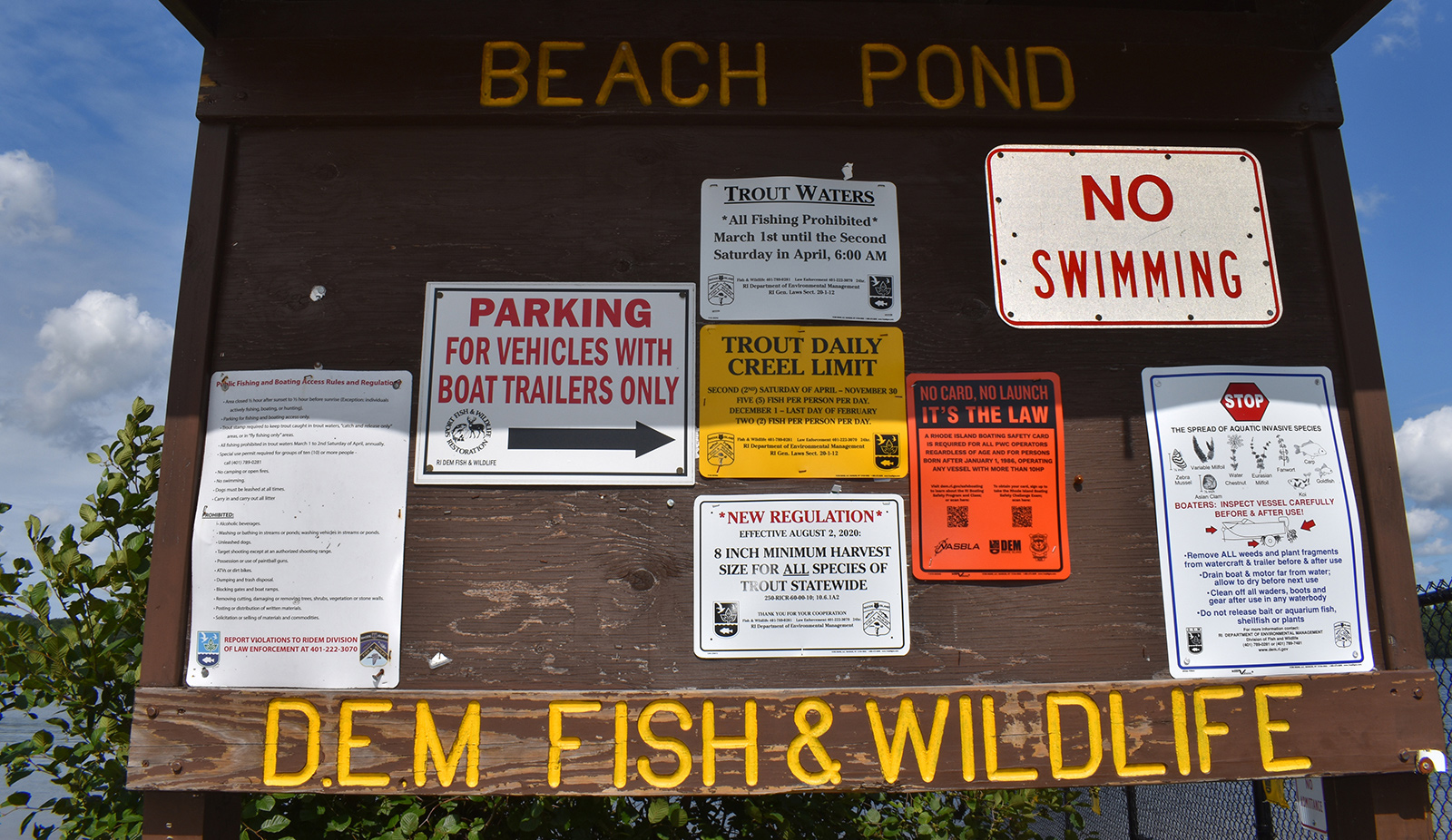
Today, visitors without a trailer can’t even park in Beach Pond’s main lot from Memorial Day weekend through Labor Day weekend. A gate needs to be lifted before a boat-toting vehicle is let in. During a late-August weekday visit to the former swimming hole — two friendly DEM seasonal employees were working the gate — I had to park up the road at a trailhead lot. (I’m not complaining, as the walk wasn’t that far. Of course, I might feel differently if I were living with a disability.)
Across the street from the sizable and barricaded boat/trailer lot is barely enough parking for a handful of cars. Boaters and anglers are the privileged class at this state-run fishing hole that is stocked annually with hatchery-raised trout. (Beach Pond is part of the 14,000-acre Arcadia Management Area.)
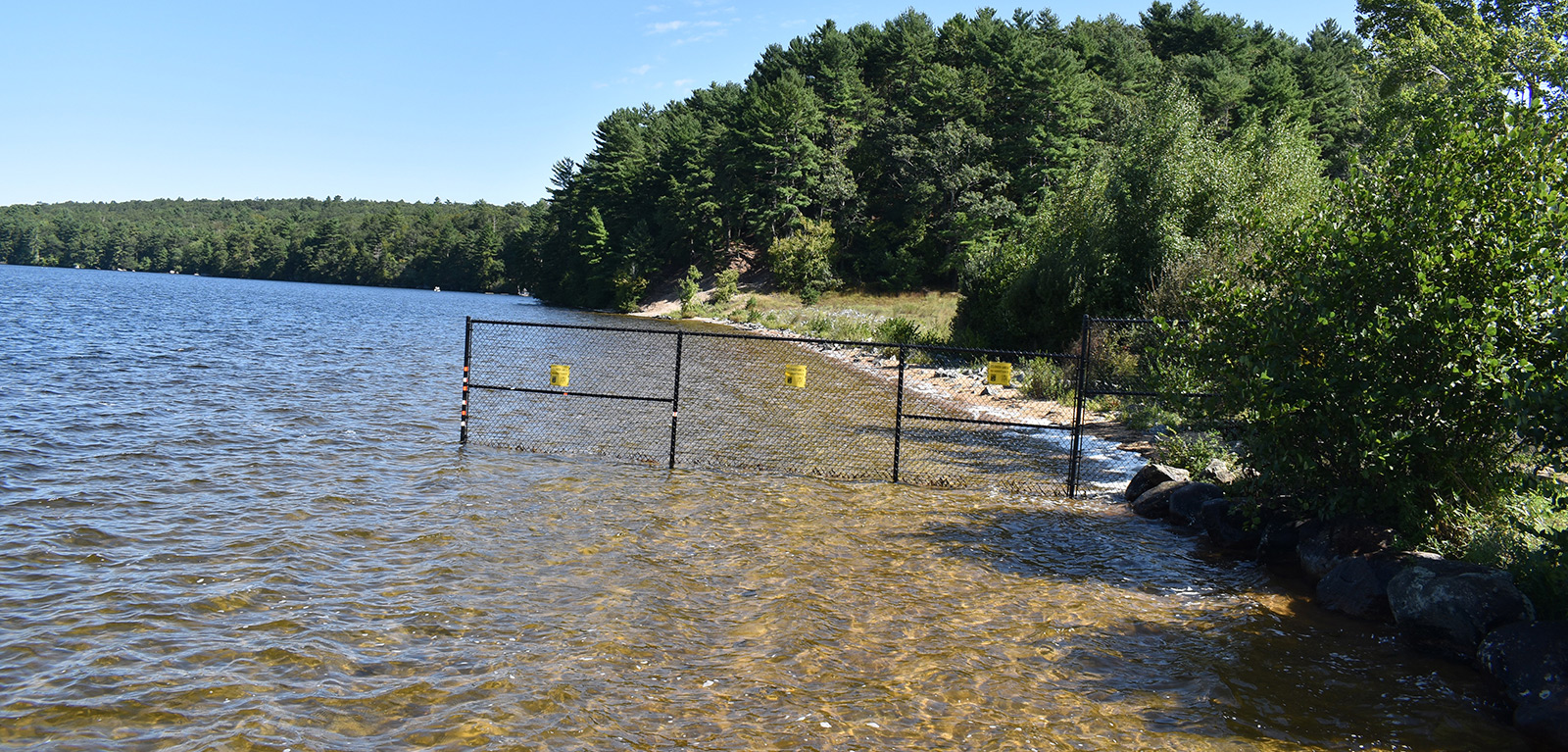
A chain-link fence runs parallel to the dock. This fortification doesn’t prevent erosion or stop stormwater runoff, but it does impede a possible wader’s/swimmer’s path to an extremely narrow strip of sand — one of the last remains of a popular swimming hole.
“Although some people view and use it as a beach, Beach Pond is not a state beach and DEM does not manage it as a state beach,” according to a DEM official.
He told ecoRI News in a recent email that “it had to be shut down due to enforcement issues.”
In 2012, DEM’s Division of Parks and Recreation transferred management of the property to the agency’s Division of Fish and Wildlife.
“Responding to resident boaters who disliked having to pay to use the boat ramp on the Connecticut side of the pond, DEM in April 2014 applied for funding through the US Fish and Wildlife Service’s Sportfish Restoration Program to build a boat ramp, floating docks, and a 15-space parking lot for vehicles towing boats,” according to the agency official.
Seven months later, the U.S. Fish & Wildlife Service (USFWS) awarded DEM $522,000 for those purposes. Beach Pond’s new boating and fishing amenities were unveiled in 2015.
The DEM official noted federal funding always comes with conditions.
“In the case of the Sportfish Restoration Program, the biggest condition is that DEM is required to prioritize access to the parking lot by those seeking to use the boat ramp,” he wrote. “This is because revenue for the program comes from manufacturers’ excise taxes on sport fishing equipment, import duties on fishing tackle and pleasure boats, and the portion of the gasoline fuel tax attributable to small engines and motorboats. All this revenue goes into USFWS and USFWS allocates it in a formula-based distribution to states every year.”
The Sport Fish Restoration Program gives DEM permission to allow others to use Beach Pond if they are not preventing boaters and anglers from accessing the boat ramp.
“DEM only restricts access in instances where non-boating users are interfering with the use of the facility by boaters,” according to the state agency.
Beach Pond visitors lucky enough to park across the street, or up the road at the trailhead, can walk the main parking lot and ogle the boat trailers and count the many “No Swimming” postings, or skip stones as long as they don’t clang off the dock.
Unless swimmers were doing cannonballs off the dock or attacking boats like a pod of orcas, it seems selfish to ban swimming in a healthy pond the size of nearly two dozen football fields while allowing fossil fueled-powered boats to pollute the water and the drone of Jet Skis to give local wildlife a headache.
Federal regulations require DEM to monitor and ensure the property is used for boating and fishing purposes for its “useful life,” or 25 years. So, by 2040, Beach Pond could be reopened to swimming.
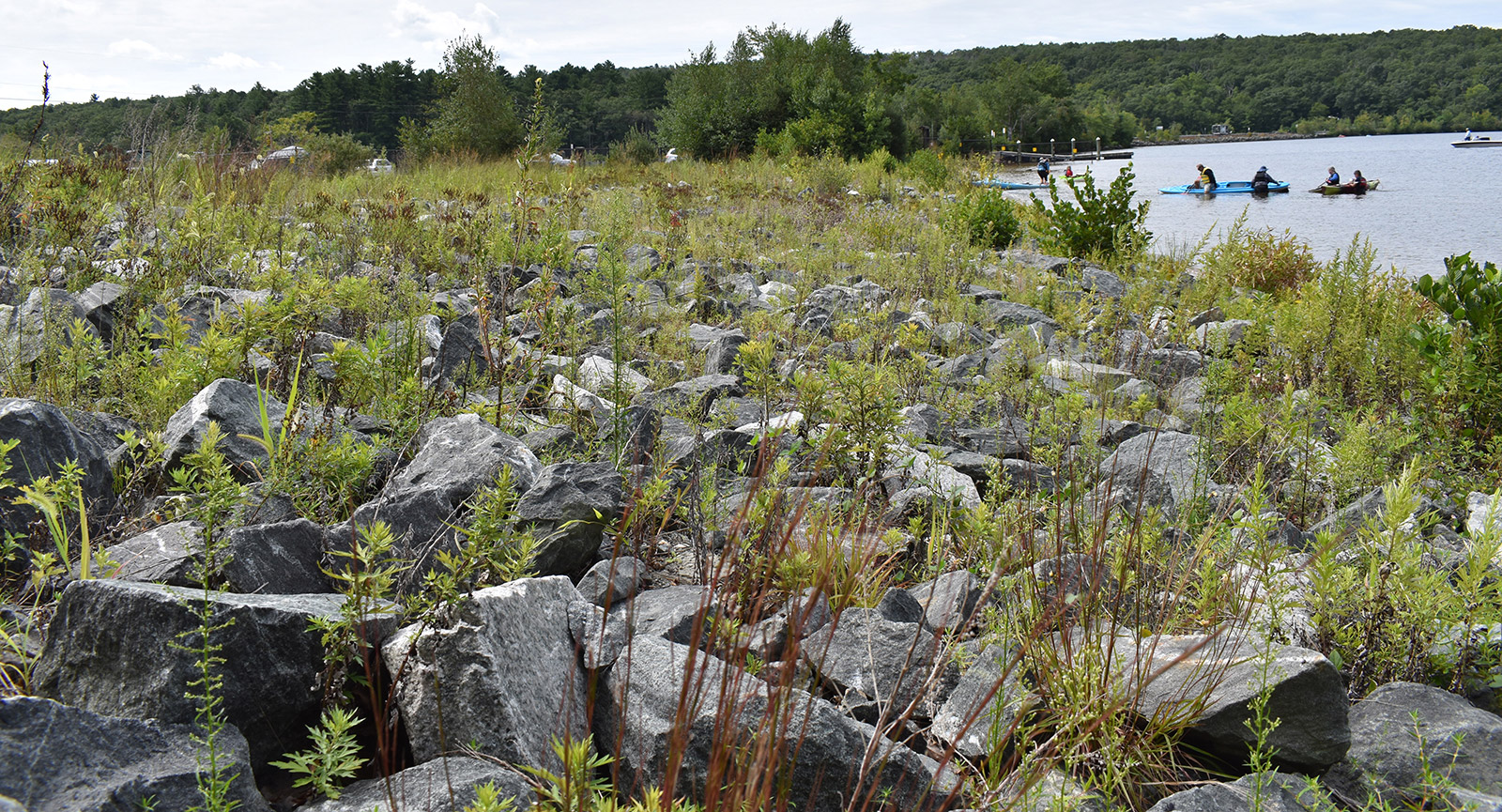
Town Council member Calvin Ellis, 79, has lived his entire life in Exeter. Since he grew up on the east side of town, he, along with family and friends, typically swam at Browning Mill Pond, which is also in the Arcadia Management Area. Browning Mill Pond is about 9 miles from Beach Pond.
In the summer of 1974, the high school history teacher worked weekends at Beach Pond to supplement his income. He remembers the beach was open to swimming then and often attracted a good-sized crowd. He doesn’t believe lifeguards worked there that summer — “I’d remember talking to at least one,” he said. He also doesn’t remember any weekend buffoonery.
Only about a third of Beach Pond is in Rhode Island; the rest is in Voluntown, Connecticut. Much of the land around the pond in the Nutmeg State is privately owned. The opposite is true in the Ocean State.
Ellis noted that in the 1970s the beach featured a bathhouse. Sometime in the ’90s the bathhouse was replaced with a modernized pavilion. He said the Rhode Island portion of Beach Pond was popular with Connecticut residents looking to take a refreshing dip. Beach Pond also was long popular with Providence residents and others from the state’s urban core.
In 2008, when the beach was closed, Ellis was the Town Council president. He said he doesn’t remember the beach closing generating any local reaction one way or the other.
“As far as I can remember, it was never on the agenda,” Ellis said. “It wasn’t a significant issue back then. Beach Pond wasn’t a town facility so we weren’t responsible.”
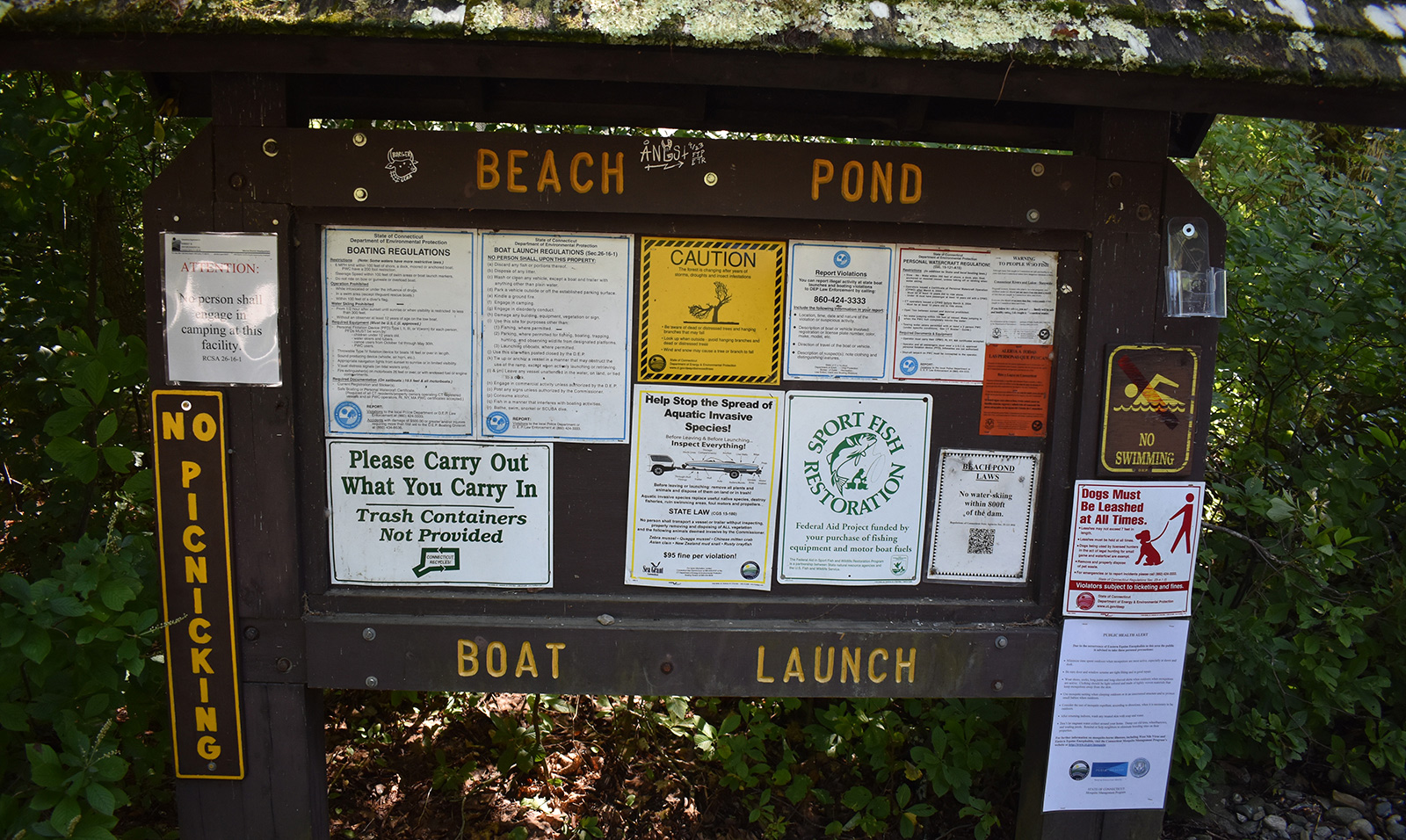
The Connecticut side also features a boat ramp and, like in Rhode Island, swimming anywhere near the dock is prohibited. Unlike in Rhode Island, however, you don’t have to be towing a boat to park. Parking there is open to hikers and boat-less anglers. There are no “No Picnicking” signs on the Rhode Island side, however.
Others I spoke with for this piece recalled the pavilion with a classic New England snack bar that sold all the summertime favorites. The only evidence such a building existed is the clearing in the woods where it once stood, and a cement foundation.
By the mid-2000s — before the beach was closed to swimming or to “protect water quality and native habitat” — adult beverages and disagreement were visiting more regularly.
Sheila Reynolds-Boothroyd, who has lived a mile or so from Beach Pond since 1968, called the popular pond’s history “interesting.”
“You could write a book about it,” she said. (Some readers probably think I’ve done just that.)
The longtime board member of the Exeter Historical Association recalled the Department of Natural Resources — DEM’s prior name — grappling with some rowdiness, litter, and finding lifeguards to work a beach where people were sometimes “hard to handle.” She said most of the shenanigans and rule-breaking began in the mid-1990s. For a while, she said, a police presence was required.
Baby diapers, plastic bottles, empty beer cans, and food packing were among the items left behind by thoughtless visitors.
At the height of the pond’s popularity, Reynolds-Boothroyd recalled cars parked up and down Ten Rod Road to the Connecticut border. “No Parking” signs now dot both sides of Route 165.
“People were disrespecting the rules,” said Reynolds-Boothroyd, who noted her kids learned to swim in Beach Pond. “They were leaving a trashy mess everywhere.”
Jet Skis “racing all over the place” are the problem now, according to Reynolds-Boothroyd. Besides making a racket and “zipping around doing tricks,” she said the Jet Ski crowd often leaves behind a trail of flotsam and jetsam.
Among the problems hampering other Rhode Island waterbodies are the main sources of enterococci bacteria: wastewater treatment plant effluent; leaky septic systems in need of repair or maintenance; cesspools; stormwater runoff; sewage dumped from recreational boats; pet, domestic animal, and wildlife waste; and the improper land application of manure as a fertilizer.
Blue-green algae blooms are caused by a combination of different factors, including the overuse of fertilizers. Cyanobacteria is found in almost all freshwater bodies, but to grow into a significant bloom, it requires excessive amounts of nutrients such as nitrogen and phosphorus, which are almost always carried into the water by stormwater runoff. These blooms can produce toxins that can harm humans and animals.
Bacteria, a sickening amount of fertilizer, the race to develop every scrap of open space, the climate crisis, federal and state agencies playing favorites, and the jackassery of some are conspiring to ruin a staple of summertime fun.
“It was a beautiful beach,” Reynolds-Boothroyd said, “and everybody misses it.”
Frank Carini can be reached at [email protected]. His opinions don’t reflect those of ecoRI News.

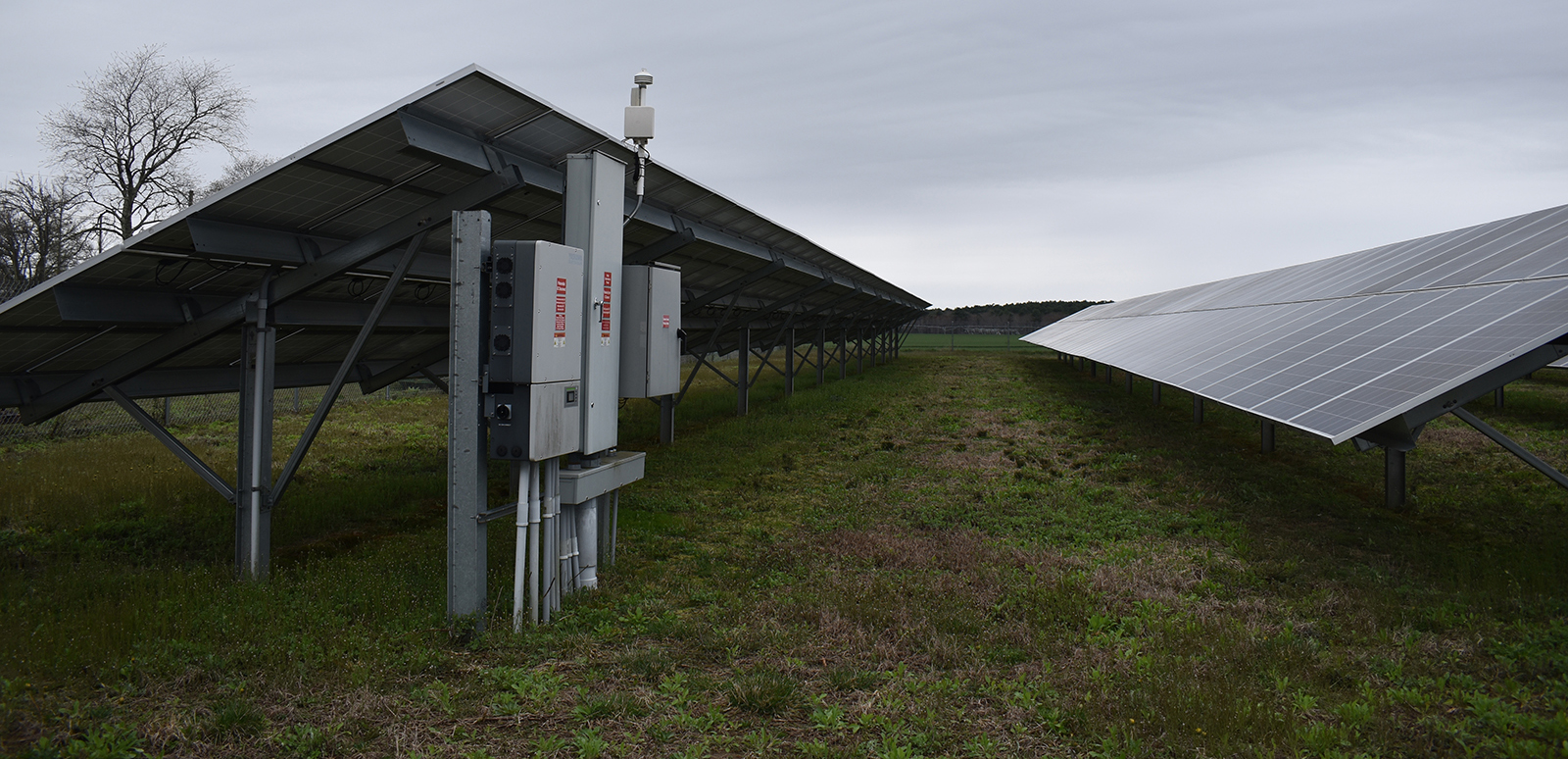
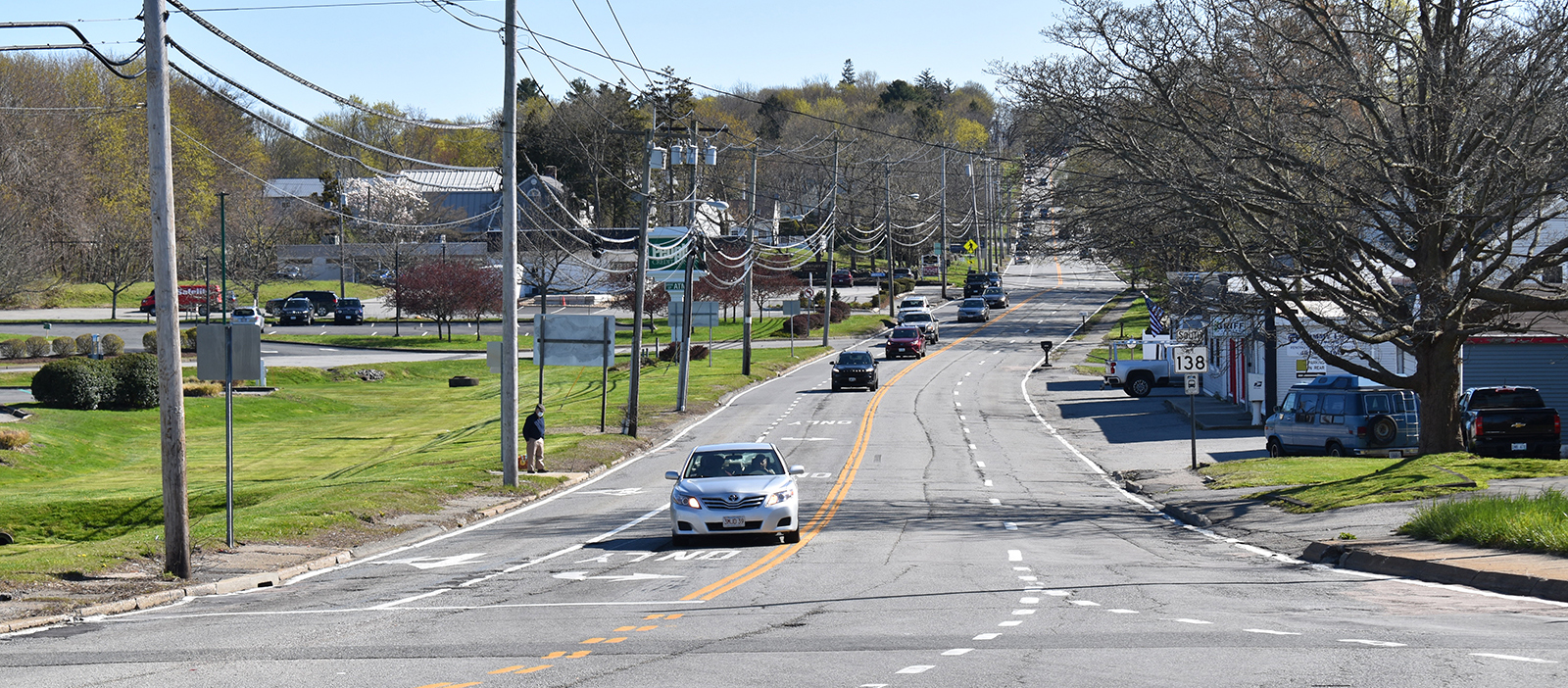

I was very frustrated the last time I went to Beach Pond for hiking and couldn’t get parking while the huge parking lot across the street had a few trailers in it. Seems really backwards to be reserving so much infrastructure for one user group on state-owned land.
I also have been dismayed by how many public areas are closed to swimming but open to other types of recreation– it seems like an increasing number. In the age of climate change, this seems like an equity issue.
DEM, open the beach. And then get around to opening all the parks funded by the LWCF that have been illegally closed.
Opening the boat ramp in Rhode Island created an instant and ongoing public safety issue with jet skiers. In other words, Rhode Island DEM took the federal money and imposed restrictions on use of the lake, but they don’t enforce safety regulations. I have been at the west end of Beach Pond for 60 years. For decades we could swim across the lake at our end. These days you take your life in your hands by doing so. If I flag down jet skiers who are going full speed in the posted 6 MPH area at the west end, they ignore me or give me the finger. Thanks so much to DEM for crests serious problem and now ignoring the consequences. There will be a serious crash sometime to no one’s surprise
Beach Pond swimming beach was a disgusting mess when it was closed years ago. Diapers loaded with excrement and loud boisterous behavior and violence pretty much sealed the deal. Like most governmental bureaucrats the RIDEM took the easy way out and closed the pond yo swimming rather than invest in enforcement of the rules and allow responsible residents to enjoy their public resources. Don’t blame fishermen and women as their money paid for the boat landing. It’s time for all “users” to pay their fair share and give these agencies resources to support the lawful use of our public lands and waters
Let’s be honest- the RI beach area closed because it was absolutely out of control. Violence and litter everywhere. The boat launch was also out of control and finally they are starting to do something about it, but even with fencing and supervision there is still a clear disregard for the rules. It is not unusual to see 50-100 people on still swimming and partying on the closed beach. Why would the state allow someone to rent jetskis to unqualified drivers who refuse to follow the law, or basic safety regulations? It is no wonder the beach was closed when people refuse to act appropriately! I say close the whole place!
Yup they broke my mirror on my truck 3 weeks ago…riff raff still come there…drinking,drugs,litter,,wheres the cops or dem now…guys only at gate till 3 or so…open field after that….moving to Ozarks. In few weeks Good luck….been here all my life….big fish in that place!!! Going to find bigger ones and retire